Matt Dodwell epées me to pieces. I'm a bit new to the video technology here, but it seems to work better the second time you run it for some reason. Things to look out for when you do: Matt's level shoulders compared to my continually tipping ones; Matt's neat parries of my useless lunges compared to my wild flailing at his feints; Matt's expert touch on my foot to score the point compared to my accusing look at that foot after he has done so.
Fencing Video
Posted by John McClure at 2:52 pm 6 comments
Fencing
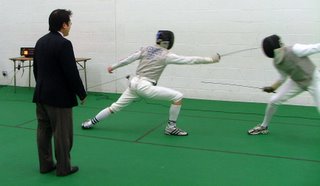
Fortunately the mask is very good at stopping you losing an eye.
I lunged. I parried. I feinted. I remised, reprised and reposted. And I lost. Heavily. Three times.
First up was the foil verses Jamie Kenber. They could make getting dressed for fencing an event in itself, but then I suppose it is rather important to do it right for safety’s sake. Suitably togged (and wired) up, I took my guard against the reigning British champion, with Ken, resplendent in blazer and tie, presiding.
“En garde!”… check… “Are you ready?”… are you joking?… “Fence!”…ok, here we g…oh… that’ll be one-nil then will it?
And repeat.
Fifteen times in a row.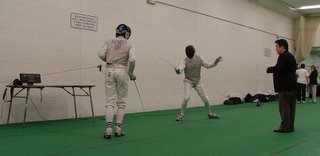
The British Champion waits for me to make a false move before striking. He didn't have to wait long.
To say that Jamie Kenber is rather good at foil is like saying that George Best wasn’t bad at football. Fair enough, I suspect any of the rest of the foilists in the room could probably have beaten me 15-0 too, but at least half the times he hit me he did it so fast and so accurately that the sound of the buzzer genuinely surprised me because I hadn’t felt a thing.
Afterwards, as I dismantled my foil outfit and started trying to work out how to put on my sabre gear, while Jamie put on his jeans and started trying to work out what to do with the rest of his evening, he confessed that he wasn’t quite at his best at the moment as he’s carrying a bit of a back injury. All I can say is God help the rest of you foilists when it clears up.
After a quick breather, it was on to the sabre verses Michael Coombes. Having spent pretty much the whole of the first fight like a rabbit trapped in some particularly transfixing headlights, I was determined to get a bit more aggressive in this one. “Fence!” cried Ken. I bounded forward and got slashed on the head for my trouble – time for a rethink.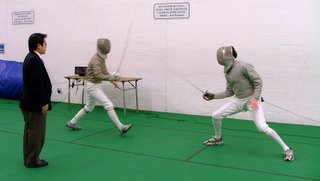
Michael Coombes's attacks were relentless. So was my failure to do anything about them.
Time and again Michael came at me and I failed utterly to parry his attacks. Time and again as we shuffled back to our marks I did that thing that batsmen and golfers do after a bad shot – I replayed the parry in the air as I would have liked to have done it a moment before and shook my head ruefully. This was a fairly good indicator of how far behind the game my brain was working – I was just about ready to parry the previous attack as the next one began.
Finally, I dug my heels in and remembered the odd fragment that people had worked so hard to teach me over the previous three weeks. I initiated an attack of my own. It was easily parried, and the reposte would have severed my jugular vein had I not been wearing the mask, but it got me thinking that just maybe I might get a point.
With my next attack, I did! As had been the case with most of the other clashes, I’ve really no idea what happened, but the buzzer buzzed and Ken pointed at me and announced that the score was now 10-1 in Michael’s favour. I carried on with my attacking strategy. It didn’t work. I lost 15-1.
By now, I was exhausted, despite having done in total (if you don’t count getting into and out of the gear) about 3 minutes exercise. The layers of protective clothing are very reassuring when someone is waggling a sword at you, but it ain’t half hot under it all.
I stripped down out of the sabre gear and set about dressing for epée. My opponent this time was Matt Dodwell, silver medallist in the British Youth Championships and 3rd ranked junior in the country at the moment. He’s also a good couple of inches taller than me and has a reach like Michael Phelps touching the wall.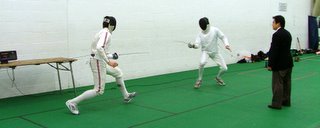
Matt Dodwell advances with his big long arms, preparing to stab me in my big fat head.
As I was walking back to the piste Michael, my previous opponent, took me to one side and offered some last minute advice. It was kind of him, and I wish I could have repaid that kindness by remembering what he’d told me before I found myself 7-0 down again. Finally I did remember – “just stick your arm out as far as you can when he attacks and you might get a simultaneous hit” – and did as I had been told. My reward was my second (and last) hit of the night.
In truth, it slightly backfired as a tactic. Much like when Liverpool score early in the Champions League, I couldn’t help but feel like I’d only succeeded in making the opposition cross. With his next attack, he fleched. A fleche is essentially running at your opponent and hitting them on the way past. He later told me it was one of the best ones he’s ever done. The fact that I offered such pitiful resistance perhaps contributed to that.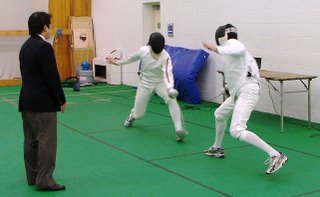
As Matt reaches in hit me on the foot, I desperately try to parry to avoid him ripping my very attractive socks.
From there on, he pulled out all the stops, hitting me with absolute impunity on the foot, the head, the arm, the chest and the throat. I mostly didn’t have a clue what was going on (that’s true in general, but particularly so whilst fencing), but Ken informed me afterwards that I’d been done very artfully by a real expert.
And so the fencing came to an end. I have enjoyed it thoroughly. I can see why it’s not a more popular spectator sport – it’s too fast to follow unless you’re an expert and you know what to look for – but from behind the mask, it’s very exciting.
I spent most of last night feeling like I was letting down all the people who had given me so much of their time in recent weeks. I felt like everything I’d learnt went out the window the moment Jamie Kenber stabbed me in the chest before I’d even reacted to being told to fence. My teachers had stoked me up with numerous techniques for parrying and attacking, and I’d practiced them at home (La Vache is cut to shreds) until I felt reasonably comfortable doing all of them. In the fights though, it was fairly pointless knowing how to parry a certain attack when my eyes couldn’t move fast enough to see the other guy’s sword most of the time.
But then I got home and watched some of the video footage. Their teaching wasn’t entirely wasted. My feet were quite often in the right place, and occasionally I did manage a parry, not to mention the two glorious points I scored. I was glad to see that my body managed to reproduce some of what I’d learnt, despite my brain’s strongest urging to my legs to turn tail and run.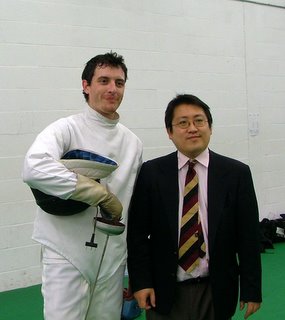
Ken pulled out all the sartorial stops in his role as president.
Huge thanks to the Oxford University Fencing Club – to Ken for his coaching, presidency and kind donation to Sobell House; to Jamie, Michael and Matt for spending time thrashing a novice; to Alex, Alec and particularly to Ellie for all their coaching and encouragement; and to all the rest of the members for putting up with a duffer taking up one of their pistes all night and for not laughing too much at his efforts.
Also, thanks as ever to the fan-base – to the other Johns, Kev and Tracey for taking the photos, shooting the video and making the sarcastic comments throughout. I’m nothing without you people.
Fencing Results
Foil
Lost to Jamie Kenber, 15-0
Sabre
Lost to Michael Coombes, 15-1
Epée
Lost to Matt Dodwell, 15-1
Posted by John McClure at 4:32 pm 5 comments
Fencing Preview

“The three swords used in fencing competitions are the foil, the epée and the sabre.
The foil has a flexible rectangular blade with a blunt point. Touches may be made with the point on the trunk of the body between the collar and the hipbones.
The epée, the traditional sword of duels, has a rigid triangular blade with a point that is covered by a cone with barbed points. Touches may be made on any part of the body.
The sabre is a flexible triangular blade with a blunt point. Both the point and the cutting edges can be used to score touches, which must be made on the body, above the waist, including the head and arms.
In all events, a wire is attached to the fencer’s sword. This wire runs through the fencer’s outfit to a scoring box. When contact is made on the opponent’s body, a light flashes on and a buzzer sounds to record a hit.
Over the years Olympic fencing tournaments have used a variety of formats incorporating both round-robin pools and double-elimination rounds. The format currently in use is a single-elimination tournament, such as is used in boxing and tennis.
Each match is played to 15. If the score is tied after nine minutes, one minute of sudden-death overtime is contested. Before the final minute, the referee determines, through a coin flip or drawing of lots, which fencer will win should no touch be made in the additional minute.”
[with thanks once again to David Wallechinsky and his wonderful book, The Complete Book of the Olympics]
The history of fencing in the Olympics is rich and dramatic. For all my chuntering on recently about my chances of getting sliced, diced, chopped, skewered, stabbed, slashed, hacked or in any other way run through, I was mostly just trying to make it sound exciting for you and was fairly confident that all the protective gear one has to wear would do its job. Then I made the mistake of doing some light research.
In the games in Moscow in 1980, during the semi-final of the team foil competition, the Soviet world champion Vladimir Lapitsky was accidentally run through the chest when his opponent’s foil broke his leather protective clothing. The sword severed a blood vessel but missed his heart.
In 1982, two years after winning gold in the individual foil competition in Moscow, Soviet Volodymyr Smirnov was fencing West German Matthais Behr in the world championships (which Smirnov held at the time) in Rome. During the fight, Behr’s foil snapped, pierced Smirnov’s mask, penetrated his eyeball and entered his brain. The 28-year-old Smirnov died nine days later.
Almost as bad is the number of times some light-hearted, albeit competitive, swordplay sparked such bad feeling that the protagonists resorted to actual duels in order to settle their differences.
After a dispute in 1924, the Italian-born Hungarian fencing master Italo Santelli, who was 60 years old at the time and coaching the Hungarian foil team, was so insulted by the Italian team’s accusations that he lied to an official in order to get them thrown out of the competition that he challenged Adolfo Contronei, the Italian captain, to a real duel.
They acquired permission from the government to have at it, but before they could meet, Santelli’s 27-year-old son, Giorgio, invoked the code duello and demanded that he fight in his father’s place. They met on the Italian-Hungarian border and fought with heavy sabres. After two minutes, the younger Santelli caught the Italian captain with a blow to the head that left a deep slash. The duel was stopped at that point by doctors who were in attendance.
The same games inspired another duel between an Italian and a Hungarian. This time, the former, Oreste Puliti, was a fencer and the latter, Kovacs, a judge who accused the Italian’s opponents of throwing their fights. Puliti was outraged by the accusations and threatened to cane Kovacs, and was thus promptly disqualified.
Two days later, the pair bumped into each other in a music hall. The Hungarian judge listened to the ranting Italian and then haughtily told him he couldn’t understand a word he had said, as he didn’t speak Italian. Puliti punched him in the face and asked if he had understood that any better.
The men were pulled apart, but a formal duel was proposed. Four months later, this time on the Yugoslav-Hungarian border and accompanied by seconds, swords and spectators, they got stuck in again. After an hour of slashing away at each other, the spectators separated them having grown concerned about the severity of their collective wounds. Their honour restored, the two men shook what was left of their hands and made up.
In fact, looking through the history of the Olympic fencing events, the only possibly useful tip I picked up came from the 1928 Amsterdam games. Frenchman Lucien Gaudin became one of only two people ever to have won both the individual foil and epée gold medals. His countryman and opponent in the final of the epée, Georges Buchard, later claimed that Gaudin had begged and pleaded with him to allow Gaudin to win their match – so much so that Buchard agreed to do so.
As for my opponents for Thursday night, I’ve only really met one of them.
Matt Dodwell fights epée, is the current British junior number 3 and won the silver medal in the British Youths Championships this year. He is left-handed. While this will make him more difficult to fence, I have the consolation that it will apparently “look better in the photographs”. I watched him briefly last week as he fenced Alec (who later put me through my paces). I’d love to be able to say that I spotted a weakness that I intend to exploit – other than a curious leaning towards a pint of cider rather than stout in the pub afterwards, he seemed a perfectly balanced individual - but the truth is that I’m not even good enough at fencing to realise what makes other people good. That said, I suspect the fact that he’s comfortably taller than me and has fenced at various levels for his country might just give him an edge.
I also watched Michael Coombes fence sabre last week. Michael was 3rd in the Public Schools Senior Boys Sabre Championships this year. Even with Alex telling me exactly what was going on as each touch was scored or missed, all I was seeing was a frantic mêlée of arms, swords and feet that every so often would stop when the scoring box would buzz for no reason I could discern. It got me wondering if perhaps this is the reason fencing is not a more popular event at the Olympics - I was fairly avidly glued to the TV for the duration of the last games, but I’m not sure that I saw even an edited highlight – perhaps the technicality of it all requires a higher understanding or intimate knowledge of the sport on the viewer’s part than is generally the case in order to appreciate what’s going on.
There are rules of priority that are hard to bear in mind when your mind is already full of where your feet should be or how bent your elbow is. These rules essentially mean that on some occasions, while it may look like one fencer has scored a clear hit, it is in fact the other swordsman who gets the point. As a beginner, after a while, it can begin to feel a little like a sport someone is making up the rules of as you go along in order to make sure you don’t win.
The only thing I did notice about Michael’s style that may be helpful was that he likes to move forward – then again, perhaps the chap he was fighting simply likes to retreat – either way, I’m going to adopt a tactic of running at him as fast as I can to see if I can upset his natural game. This tactic might rank up there for stupidity alongside my long held game plan should I ever find myself playing snooker against Ronnie O’Sullivan to hit the balls all over the table and disrupt the patterns he’s used to playing within.
My foil opponent is Jamie Kenber. I’m almost sure I’ve seen someone at the fencing club with that name on his back at least once, but I can’t bring his style to mind. All I really know about him is that he is ranked ninth in the senior British rankings and is the current British foil champion. In the final he beat one Richard Kruse, who fought for Britain in the Athens games. I made the mistake of looking in the Team GB official Olympic report tonight to see how Mr Kruse had done. He got to the quarterfinals, which by my (perhaps skewed) reckoning makes him one of the best eight foilists in the world. He lost out to the man who eventually took the bronze medal.
His performance was the best by a British fencer with any weapon since 1964 when Henry Hoskyns, a 33-year-old fruit farmer from Somerset, finished seventh in the foil and won the silver medal in the epée. Kruse's achievements were all the more impressive given that he had only recently graduated from university and was fighting professional opponents with superior back-up and training facilities. And then he came home and Jamie beat him. And now I have to fight Jamie. So that should be easy.
Perhaps I’ll try some of that begging and pleading after all.
Posted by John McClure at 11:38 pm 11 comments
Strictly Come Fencing
I have a confession to make. Anyone who knows me and has had the misfortune to find themselves on the dance floor when I take a notion to strut my stuff will be aware that I’m not a fan of conventional dancing. You can keep your regimented steps and synchronised movements; I’m usually the one in the middle annoying everyone with the randomness of my gangly gesticulations. This lack of fanaticism for all things Fred Astaire extends to watching other people indulging in such activity – Strictly Come Dancing? Strictly No Thank You.
And yet, perhaps worse than tuning in on a Saturday night to watch seasoned professional ballroom dancers guide gormless celebrities through a quickstep or a jive in an attempt to survive the dreaded public vote, I’ve caught myself several times this week not changing the channel when the nightly magazine programme that accompanies the weekly series appears on my television.
Strictly Come Dancing – It Takes Two (for that is what it is called) tracks the trials and tribulations of the clueless amateurs as the professionals try to teach them a new dance in preparation for the following week. Tonight, I caught myself watching it again and also noticed that I have been doing so rather more than someone with no interest in that sort of thing ought to – and certainly rather more than someone who has never watched the actual programme proper.
I’ll admit to having a slight soft-spot for the host, Claudia Winkleman, and that her penchant for a plunging neckline has done little to make me want to switch channels and watch ITN butcher the day’s news, but there’s something deeper going on. As I sit here writing with the show on in the background, I should instead be dancing up and down the living room wielding a sabre and attacking an ironing board. The reason I’m not practicing my fencing as I should be is that I’m enjoying watching other people going from a position of being all at sea to dancing a waltz as though they’ve been doing it for years.
Just now, I nodded with rueful recognition when Zoë Ball confessed to messing up her foxtrot because she forgot which foot she was supposed to start on. I felt Goughie’s pain when he grimaced with frustration at not being able to do the five things he’d been told to do all at the same time.
In an hour, I’m heading off for my last training session with the fencers before they slice and dice me in the three fights next week. Learning is repetition. If you’re the pupil, you do something wrong in a slightly different way over and over and over again until you get it right. Then you do it wrong again and swear a lot because, damn it, you had it mastered a minute ago!
If you’re the teacher, you tell the pupil the same thing in a slightly different way over and over and over again until something clicks and he gets it right. You commend him far too much for finally doing what you told him to do in the first place, and then you laugh at him when he messes it up again and gets cross.
I’ve said before, but will say again, that I greatly admire the patience being displayed by the people trying to teach me; it outlasts my own without fail and by a long, long way. The one thing I am learning better than anything else is that learning itself is much easier to do when you’re a child and repetition (as you will no doubt know if you have ever encountered a child who is asking for something) is just about your favourite thing in the world.
UPDATE:
Jamie Kenber (foil) is the current British Men's champion, beating British Olympian Richard Kruse in the final this year. He is currently ranked 9th in the senior rankings.
Matt Dodwell (epée) is current British Junior No.3 and was the silver medallist in the British Youth Championships this year. He is currently ranked 21st in the senior rankings.
Michael Coombes (sabre) was 3rd in the Public Schools Senior Boys Championships this year.
All three are members of the University of Oxford first team.
You can think of them as the three musketeers. I shall be thinking of them as the three guys who have very kindly offered to come along and chop me into little pieces next week.
Posted by John McClure at 7:39 pm 7 comments
Different Strokes
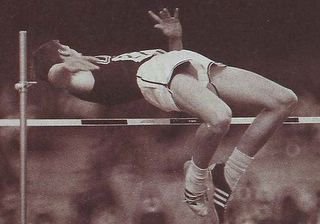
What a different place he world of high jump would be had Dick Fosbury not thought of having a go at it backwards.
I’m a dreamer. I’m reliably informed by John Lennon that I’m not the only one, but still, that’s what I am. One recurring daydream that started shortly after I came upon the notion of doing all this involves discovering that far from being blunderingly inept at all things Olympic, there might just be an event that I’ve never tried before but turn out to be astoundingly good at.
In idle moments I imagine the Great Britain pole vault coach scratching his head and looking at a clipboard as I fall back to earth having cleared the bar by a foot. He is confused and exclaiming “But… that’s a British record. By half a metre. You’re in the team for Beijing.”
I confessed this dreaming habit just now to my colleague and friend Statue John while we smoked very un-Olympic cigarettes in the alleyway beside our office. He confessed in his turn that he has spent many idle hours thinking about “doing a Fosbury” – coming up with a revolutionary technique for performing one of the events that ensures victory despite a lack of what is commonly held to be the usual physical requirements of an Olympic champion.
At the 1968 games Fosbury revolutionized the sport of high jumping with just such a new technique, which became known as the Fosbury Flop. Instead of leaping facing the bar and swinging first one leg and then the other over the bar in a scissoring motion - the dominant method of the time - Fosbury turned just as he leapt, flinging his body backward over the bar with his back arched, following with his legs and landing on his shoulders.
The best John and I could come up with was some new swimming technique that would allow you to win the 50m Freestyle despite having a massive beer gut, baggy swimming trunks and (John insisted) a lengthy mullet unrestrained by anything so naff as a swimming cap.
Certain events heavily regulate techniques – for instance, I’m fairly sure that John’s suggested new long jump technique involving landing headfirst and rolling forwards (anyone who has seen the A-Team will know that such a technique can carry a man far enough to land a safe distance from and exploding jeep) would not only result in a concussion but also be against the rules of the event.
But others (like freestyle swimming and most of the track events) just involve covering a set distance as quickly as possible. Michael Johnson has a fair claim to being one of the greatest track athletes of all time, and he modelled his running style on that of an ostrich. His coaches told him it wouldn’t work, but he refused to listen (his training partners had to tell him he had gone a bit far when he started burying his head in the long jump pit mind you).
So rack your brain, loyal reader, and post a suggestion – be it pole-vaulting with a pole twice as long as the ones the experts use, or paying homage to Dick Fosbury by running the hundred metres backwards – all suggestions will be heard. And then roundly mocked, no doubt.
Posted by John McClure at 5:28 pm 10 comments
On Guard!
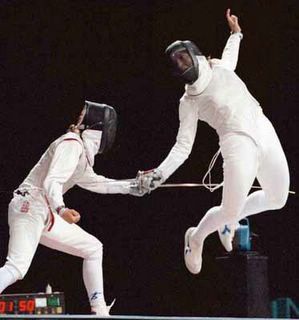
In between fights, fencers like to get together and practice their high jump technique.
Fencing is one of only four sports to have been included in all of the modern Olympic games. It’s also one of those things that every man who never really grew out of being a little boy would really rather like to good at. Whether you fancied yourself as Errol Flynn’s Robin Hood, Oliver Reid’s Athos, or (in my case) Guy Williams’ Zorro, sword fighting was something no young boy with access to a couple of sticks and a willing accomplice could resist.
Thanks (once again) to Kev Game and his remarkable ability to pull strings, I found myself last night in the Cricket Schools at the university sports centre, surrounded by sword-wielding experts dressed up like svelte bee-keepers. I was looking for Ellie, the kind soul who has offered to teach me the foil (one of the three fencing disciplines – the other two being epée and sabre).
Our plan, hatched by e-mail, had involved me coming along to a practice session and being put through my paces. It was a good plan, ruined only by my latest embarrassing injury. It was bad enough making it through forty arduous, high-speed kilometres of cycling in the triathlon without so much as a wobble only to come crashing to the ground a few weeks later cycling to the shops one Sunday evening, but this time, I may have outdone myself.
I’ve had a bit of a cough for a few days (I’m no doctor, but I suspect that walking home from a nightclub at five in the morning with my shirt open to the waist may have had something to do with it). The cough was just beginning to subside, but it was determined not to go without a fight. During one particularly violent outburst, I somehow managed to strain a muscle in my right side. It’s a tiny muscle – one I didn’t even know I had – but one that seems to be fairly heavily involved in just about every movement I try to make.
Fortunately for me (and my aching side), the first steps in learning to fence would seem to be just that – steps. Having found Ellie and marvelled at how much consideration she seems to have given my quest (“We’ll try to get you fighting left-handers if we can. It’s harder, but it will look much better in the photographs.”), I was introduced to Alex, a sabre specialist, who took me through some footwork.
One of the toughest things about this whole challenge is learning how to do new things. I don’t yet consider myself an old dog, but I do seem to struggle with the learning of new tricks. When I first started giving some serious thought to the challenges I would face in trying to have a go at all the Olympic events, I expected a lack of fitness to be by far the largest obstacle to my completion of most of them. Naively, it didn’t really occur to me that a lack of talent would also be a problem.
As I stumbled backwards and forwards trying to keep my distance from the young lady pointing a sword at my head and reminding me (very patiently) to keep my shoulders level, I suspect I looked more like a man caught up in his first barn dance than Errol Flynn toying with the Sheriff of Nottingham.
I am lucky to have once been good enough at a golf that the odd beginner occasionally asked me for advice. I would do my best to offer it patiently and politely (in the manner it had always been offered to me), but I was constantly fighting the urge to bellow, “Oh for God’s sake, just hit the bloody thing!” As such, I have unending admiration for everyone who has thus far offered me coaching (in any discipline) and managed to resist bellowing the same thing at me. Alex and Ellie are two more such people to add to the list.
Once Alex had finished teaching me how to dance up and down the piste, and even run me through (a poor choice of expression perhaps) how to go about striking my opponent with a sabre, she passed me back to Ellie who introduced me to the foil.
As it turns out, there are five different guards one could adopt when fighting sabre, but Alex must have realised fairly quickly what level she was pitching at and just taught me the easiest one. Ellie had no intention of letting me off so lightly with the foil and was quickly talking me through the nuances of sixte, quarte, septime and octave. Luckily, she also sent me home with a book full of pictures to jog my memory.
If the helmet masked my puzzled expression, I suspect my teacher quickly revised the detail of her teaching plan when we started talking about instincts. Having told me that essentially every movement in fencing is “instinct refined and honed”, she tried to demonstrate her point my slowly lunging towards my left side.
“What would your instinct tell you to do there?” she asked.
“Well – to move my sword across my body and deflect your sword.”
“Very good! Then what?”
“Then I’d probably reach over and punch you in the face with my other hand and wait for a fellow musketeer to break a chair over your back.”
Despite my cavalier attitude, we hatched a new plan, the broad (if optimistic) aim of which is to get me through all three fencing disciplines before the student body disappears at the end of Michaelmas Term (so the beginning of December). They have their work cut out, but they sent me home with a helmet and a sabre so that I could get some practice in at home as my side improves. As such, I take great pleasure in introducing you to my new practice partner. I think I’ll call him ‘La Vache’.
He may not look up to much, but the horns really freak me out.
In the eyes of the law, a sabre is considered a deadly weapon, and therefore not for carrying on the bus. Amazingly though, everyone was in agreement that the act of shoving half the blade into my umbrella was enough to render it legal and I set off for home with a helmet under my arm and a Bank of Scotland umbrella-sword at my side. I’m not so grown up that I won’t confess a certain feeling of satisfaction at paying my bus fare with a ten-pound note despite having change in my pocket. For once, the driver didn’t ask me if I had anything smaller.
Posted by John McClure at 3:13 pm 12 comments
Swedish Flatpack Inspiration
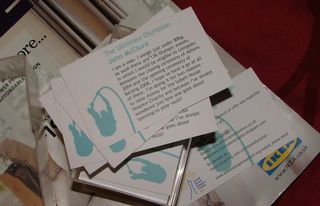
You may have noticed, avid reader, that inspiration and motivation wax and wane rather a lot around here. When I first set about this challenge, I envisaged many hurdles that I would have to literally and metaphorically clear, but I naively didn’t anticipate motivation to be one of them – or at least not as big a one as it’s turning out to be.
Of all the things that could motivate me – the suffering, bravery and determination of the beneficiaries of the charity money I’m raising compared to my own, the enormity of the task itself, the fact that I love sport – it’s funny that it took a recent trip to IKEA to kick-start my desire to train again.
My housemates, Jamie and Kate, are soon moving into their brand new home. They needed to go to IKEA with a van to get a couple of beds. I needed a new bed for the spare room. IKEA in Brent Cross is open until midnight. What else would we have done with our Friday night?
Meatballs and bed shopping out of the way, all that was left was to collect our purchases from the collection depot, load them into the van and head back up the M40 to Oxford. As we shut the doors of the van on our new purchases, it was just shy of midnight. By the look of some of the faces still milling about the collection depot awaiting their furniture, we had gotten off lightly.
As we manoeuvred about the car park trying to find the way out, we were approached by a couple of damsels in distress. Somehow, they had ascertained that we were from Oxford (I’m not sure if it was the “Oxford Vehicle Rentals” or the five-foot cartoon ox plastered all over the side of the van that gave it away).
“We’ve bought a wardrobe!” said damsel one.
“It doesn’t fit in our car!” said damsel two.
“Not a problem!” said the heroes, probably breaking some sort of white-van-man code of ethics in the process.
Before heading to IKEA that night, I had met Kev from Sobell House who had very kindly come into town to give me some new Ultimate Olympian cards for handing out to baffled newcomers to the cause. They have my mobile number on them, so I gave one to the damsels in case I wasn’t able to keep up with them on the trip back to their house.
By the time we reached the wardrobe’s new home, they had read the card and were most enthusiastic. Damsel one insisted upon giving us something for our trouble. I protested that we’d been coming back anyway. We settled on a donation for Sobell House instead.
As we drove home with our beds, I was filled with the warm glow of raising money for this cause I consider to be so worthwhile. I had been inspired to get my finger out and organise some more events in a way that Tim’s nagging could never have managed (don’t ever stop, Tim!). Perhaps most importantly, I was inspired to stop living this post-triathlon playboy lifestyle and get back into training.
I’ll admit that inspiration comes in waves and confess that I spent the next day at the Oval drinking and watching Australians fighting (and incidentally playing some sort of variant of rugby in the background), and then sat up until four playing poker and drinking some more. But in the course of the following week, I rode a few of those little waves of inspiration to the gym and the pool.
For now, I’m going to post this and then go downstairs and get Jamie to fill out an entry form for next April’s London Marathon while I do the same. If the fear doing that will instil doesn’t inspire me still further, I’ll begin to get slightly worried about my prospects of ever finishing this challenge.
Posted by John McClure at 9:29 pm 4 comments
Missing In-action
“It is wonderful how much news there is when people write every other day; if they wait for a month, there is nothing that seems worth telling.”
O. Douglas – Penny Plain (1920)
And so it is that I’m sitting here in my study staring at the screen and wondering what to tell you. I have excuses for my absence, as always, but mostly you’ve heard them before, if not from me then from some other wannabe athlete with too great a liking of strong drink.
Sobell House are trying to get thirty people together to run next year’s (London) marathon. You have to enter before 21st October using a form in one of the official magazines. If you get in and want to run for Sobell House with me and several other suckers who have already said they’ll do it, e-mail me and I’ll get your name on the list.
Inspired once more by panic and a large dose of fear, I have been training twice already this week. Hopefully, over the coming days, I will also get back into the habit of boring you all silly with my nonsense.
Posted by John McClure at 10:46 pm 7 comments
Crash Bang Wallop!
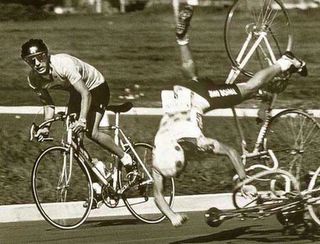
This is what a real bike crash looks like. Mine was slightly less impressive.
It was bound to happen sooner or later. I had hoped that when it did happen it would be spectacular, that I’d be in my full cycling gear, preferably in a race, and preferably surrounded by terribly concerned (and attractive) female spectators. I am disappointed to report therefore that my first major cycling crash since I was seven years old came at about nine o’clock on Sunday night as I nipped up to the shops in my jeans and a t-shirt.
I lifted my helmet off its peg on my way out, and then lobbed it back into the house using the same logic as the idiotic motorist who doesn’t bother with a seatbelt on short journeys, as though accidents can only happen after a certain distance has been covered. I didn’t bother with my gloves either. It had never really occurred to me until I was sliding along the road on my palms that the thickly padded gloves might serve a purpose other than preventing my hands getting sore from too long clutching the handlebars.
I wasn’t completely reckless in my approach. I did have my lights on, even if the only good they did was to stop the passing cars running over my bike as it lay in the middle of the road and I lay against a fence wondering why no one was stopping to see if I was all right.
As for spectacular, the crash itself couldn’t have been much more mundane. There is a right turn at the top of my road. To avoid having to step out of my toe-clips while waiting for a gap in the traffic, I tend to edge onto the footpath shortly before it and negotiate it slowly with the pedestrians. On Sunday night, as I came up to the point I usually cross the road, a car overtook me, so I had to wait for the next break in the kerb. At least, it looked like a break in the kerb.
I could hear another car coming up behind me, so I stood up on the pedals and put on a burst of speed to be able to cross to the footpath safely. I was probably doing about 30 km/h when I hit what turned out to be an ever so slightly raised kerb (no more than two inches, if that). Just as I hit it, I was standing hard on the right pedal. The bike skewed out to the left underneath me and my leg pushed on through and met no resistance.
Still with the bike between my legs, I hit the ground with my right knee and right shoulder. As I bounced and got my hands out in front of me, the bike hit the kerb again and bounced out into the road. I looked up and saw a fence I was clearly going to end up hitting. I tried to lift my right hand to fend it off, with the result that when I finally came to rest, my right arm was wrapped up behind my back and wedged into the fence by my shoulder. My helmet-less head stopped just in time.
I lay there watching the cars pass for a moment replaying in my head the strange noise I had made when I came off. It wasn’t a terrified screech or an agonised howl, it was the sort of noise you make when you hear about someone doing what I’d just done – a slight “tut” followed by a cringe and a sort of empathising “oooooooh” that implies “That’s going to hurt in the morning.”
I wasn’t worried that I’d done anything serious until I tried to move my right arm. It was when it wouldn’t move and I realised it was a lot further behind me than it had ever let on it was capable of going that I began to worry that my golf trip to France on Thursday might have been in jeopardy (always good to keep a sound sense of your priorities in a crisis I find). I sometimes sleep on my right arm and wake up in the night unable to feel it. The feeling as I lay there was exactly the same.
I rolled backwards to free it up, but it still didn’t move. I took hold of my right sleeve with my left hand and yanked my arm around to have a look at it. As I did, there was a delicate popping noise in my right shoulder and suddenly I had my right arm back and working again. I wondered if maybe I had dislocated it, but dismissed that as ridiculous. I wasn’t in any pain, and I’ve seen people on rugby pitches having shoulders returned to where they’re meant to be – if the pain is enough to make those hard nuts wince, it would surely have made me pass out.
I felt around under my shirt, half expecting to find something out of place, but in the end there was nothing that felt any weirder than usual. Shoulder and arm taken care of, I turned my attention to my knee. I bent it in and out from a sitting position a couple of times and it moved freely. I risked standing up, noting my grazed hands as I did so, and it supported my weight without complaint. It was bleeding, but I didn’t seem to have done any structural damage.
What I did next must have been a curious sight for the passing motorists (at least ten cars went past while I lay on the ground, not one of them even slowed down any more than necessary to avoid crushing my bike). Someone passing after I stood up would have seen a lanky man in torn and bloodied jeans and a t-shirt practicing his golf swing by the side of the road as his bike (with a slightly wonky front wheel) sat in the road. It was only when one such lucky passer-by honked his horn that I realised I should move the bike.
There’s lots of good news. My golf swing feels no worse than usual, so I’m still going to France. Ice packs on the shoulder very effectively reduced the swelling and eased the pain that arrived shortly after I got back to the house. On my way to work this morning (walking this time) I noticed that the wooden fence I hit is only about ten yards long and that either side of it is nothing but concrete wall.
It could have been a lot worse in a lot of ways, but thankfully it wasn’t. I got away with being a bit stupid and a bit uncoordinated. Next time, I’ll wear my helmet. And clean pants, just in case.
Posted by John McClure at 3:45 pm 6 comments
Show Me The Money!
After much fiddling about, I now have a Just Giving page through which you can all donate your hard-earned cash to Sobell House.
For the moment, I have slipped into a post-triathlon celebratory alcoholic binge. I’m going to France to play some golf next weekend, the end of that trip will hopefully signal a return to training as I’m hoping to run next year’s London marathon. The day I return from my holiday (5th September), Martin Keown is hopefully going to be launching the Sobell Raffle at the St Giles Fair in Oxford. If I can’t make it back from the airport in time to do it myself, Kev Game from Sobell House has promised to schmooze on my behalf with regard to the Olympic football match.
This coming (Bank Holiday) Monday signals the end of the first year of this challenge. Of 136 events, I will have completed just eleven. I should probably be slightly downhearted about that, but in all honesty I’m anything but. Several of the more taxing ones are out of the way (the 20km and 50km walks and the triathlon stand out) and the plans for a lot of the others are snowballing pretty much as I hoped they would.
Next summer, I hope to rent the Iffley Road track (scene of Sir Roger Bannister’s running of the first ever sub-four-minute mile) for a couple of weekends and stage a pair of Ultimate Olympian athletics meets. These will be open to all comers for a small fee (£5 an event probably) and I will do my best to entice some proper athletes along to help us gauge just how rubbish we are.
I plan to organise a couple of swimming galas along similar lines, and with any luck include the diving events on the same days so that all entrants get the added bonus of a good laugh at my expense.
Lots of you have been beavering away on my behalf with your contacts in various sports, and for that I thank you most sincerely – from former Olympic fencers to experts in shooting and rowing, the offers of help have been flowing in thick and fast.
If you’ve got an idea for an event, e-mail me. If you’ve got a friend who knows someone who has his or her hair cut by the mother of a former Olympian, e-mail me. If you want to wish me luck or hurl abuse at me, e-mail me. Thank you all for your help so far and for keeping me from abandoning my pursuit of the ridiculous.
Posted by John McClure at 4:11 pm 0 comments
More Triathlon Photos
Sorry to keep banging on about it, but I thought you might want to see what the pros from actionphoto.net managed to produce on race day. If you want a copy of any of them, let me know and I'll deride you in public whilst laughing a lot.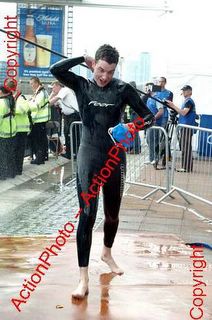
Never has one man been so pleased to get out of a wetsuit.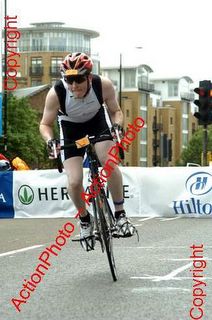
I spotted the man with the camera slightly too late to stop pulling a face.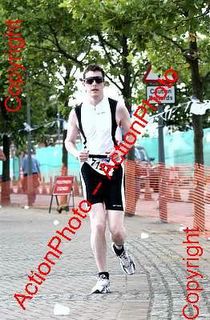
I wasn't smiling the whole way round, see?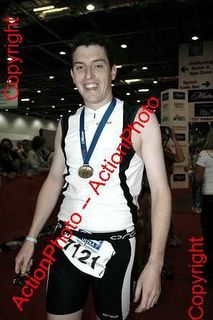
The lady with the camera said "Smile!" - this was the best I could manage.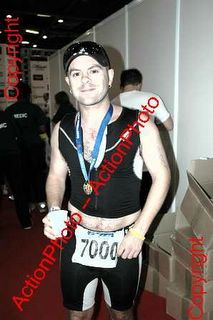
Kev Game from Sobell House - 3 hours, five minutes, thirteen seconds. Git.
Posted by John McClure at 4:57 pm 4 comments
Patron Patten
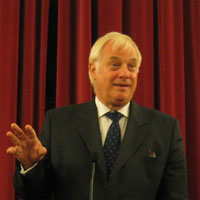
"I went to the doctor, I said 'It hurts when I do that...'".
Thanks to Kev Game from Sobell House, my latest co-conspirator, the Ultimate Olympian now has its first official patron. Lord Patten of Barnes is the Chancellor for the Universities of Newcastle and Oxford and has offered his support to the cause. He’s a very busy man, so I don’t expect he’ll be putting himself up for the anchor leg in the 4 X 100m relay team or anything, but hopefully with his help I can scrounge some help from some of the university sports clubs.
His wikipedia entry is very amusing, not least because the fact that he was once Minister for Overseas Development reminded me of one of my favourite Monty Python sketches. I’ve never met him, but he’s clearly a nice man. Hong Kongers gave him an affectionate nickname (the first and last governor to be afforded this honour) based on his rotund figure and an alleged predeliction for egg tarts.
So, “Fat Patten”, we salute you and thank you for your support.
Posted by John McClure at 4:22 pm 0 comments
Stats, Glorious Stats!

If you click on the picture above, you can see a bigger version of it which you should be able to actually read (thanks for the techie help, Mishy). I've posted it not as some triumphant announcement of my own times and position, but by way of a slautation to one ade fajemisin. He was the last person to finish, and he did so more than four and three-quarter hours after he started.
After swimming around the dock for nearly an hour, he then cycled around London for more than two and a half. Then, despite all that, he ran the 10 K in about the same time as me. I don't know if he did it for a charity, or to prove a point, or just because it was a nice day and he had nothing else planned. Any which way, I admire him greatly - he's what this website is all about - doing exceptional things very badly.
[I am also slightly disappointed that I was beaten into 666th place by a man called Daniel Slowly - talk about adding insult to injury]
Posted by John McClure at 11:49 am 0 comments
The London Triathlon 2005

Craig Doyle tries to get his head around the notion of doing 136 Olympic events.
Despite my woeful attempts at navigation (sorry, Caitlin) we made it to the ExCel centre in London’s docklands in time for an interview with the BBC on Saturday. Having established that we had mutual friends in Ireland (it’s a game Irish people and Kiwis play while abroad), Craig Doyle got on with interviewing me, Sascha and Timo about the notion of doing all the Olympic events in general and the possibility of finishing the triathlon in particular. It was great to have Sascha there – he’s an old hand at dealing with these media types – and I was particularly inspired when he told Doyle that I’d been training hard and would finish the race without a problem. Perhaps he knew something I didn’t.
As we stood by the water bedecked in our new Ultimate Olympian T-shirts (brilliantly scrounged from a supplier by Timo) and the camera shifted to Sascha, I had a look up the full length of the swim course for the first time. 1500 metres is a long way when you swim it as 60 lengths of a 25-metre pool, but somehow it looked longer all stretched out to two big lengths of 750 metres.
Another wave of sprint racers set off while I was watching – six hundred wetsuit-clad arms leapt like salmon out of the frothing madness as they battled for space and position. You need to be slightly unhinged to try and do a triathlon, but you need to be a special kind of nutter to want to win one.
Interview done, it was off to rack the bike and pick up my timing chip. In the end, I took Tim up on his kind offer and used his bike instead of the Pale Rider – but more on that decision later. As I waited for someone to arrive at the desk containing my chip, James Cracknell was having a discussion with the jobsworth at the desk next to me.
JC: “I’m really sorry, I don’t have any photo ID with me.”
JW: “Well, I’m sorry Mr Cracknell, but without ID I can’t give you the chip.”
JC: “Yeah but…” (He was trying so hard not to use the expression “Don’t you know who I am?”)
UO: “I’ll vouch for him.” I offered, “Don’t you recognise him?”
JW: “I know who he is, mate, but I can’t give him a chip without ID.” (He was trying so hard not to use the expression “It would be more than my job’s worth.”)
As the double Olympic gold medallist tried to phone his wife for help, his phone battery died. I offered him mine, but he pointed out that unless it had his wife’s number on it, it wasn’t much use to him. I didn’t confirm that I didn’t have his wife’s number (I let him wonder), just wished him luck and shuffled off to rack the bike – my first event with a field containing a real Olympian and I’d clearly gained an early psychological advantage that he’d find hard to shrug off.
After a wander around the expo, it was off to the hotel to check in before heading to Canary Wharf for some excellent cabo-loading (thanks, Caitlin). I climbed into bed at about eleven, convinced I wouldn’t sleep, but as I lay there, sporting my London Triathlon wristband like some escaped hospital patient, a strange calm descended. It’s hard to know where it came from, but I’m sure the Steve Martin film on ITV also helped me nod off.
On Sunday morning, I still felt pretty calm. I ate breakfast, drank my isotonic drinks and generally went through the motions of getting ready without a sign of a butterfly in my stomach. And then I started watching England trying to close out a victory in the second test. By the time we had to leave the hotel, Australia only needed 70 more runs to win. I was no longer calm.
Unfortunately, I missed Timo’s wave starting as I stood in a queue to get into the transition area with the rest of my gear. I got a phone call a few minutes later from his (gold medal winning, world record holding) brother wishing me luck. I was calm again. Sascha had told the BBC I’d been training hard and would finish without a problem; it must have been true.
Ritchie Barber (another gold medal winner) had come down with Sascha from Manchester to watch Timo compete. He’d brought with him a very handy bit of advice for people in a hurry to get into their wetsuits – a plastic bag popped over the foot (or hand) gets that bad boy on there in double quick time.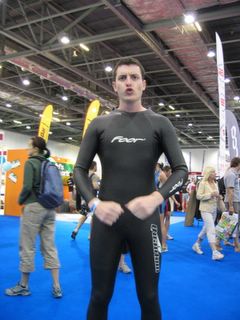
Thanks to Ritchie's tip, it only took me 30 seconds to get it on this time.
With minutes to go before the start, I studiously listened to my iPod (Evil by Interpol) and ignored what was going on around me as best I could. It worked quite well. Mere seconds from getting into the water, I felt something verging on euphoria – all those weeks of training (or, more often, feeling bad for drinking, smoking and not training) were coming to an end. In a few short hours, I’d be able to relax again.
Trying to perfect your Roger Moore eyebrow raise? Get a swimming cap!.
Those hours turned out to be anything but short.
I was one of the last in our wave of around three hundred to climb down the steps onto the pontoon. I watched with a rapidly disappearing calm as people jumped manfully into the murky, brown water and boldly struck out for the start line. Finally I spotted a couple of people on my wavelength. They were sitting at the end of the floating platform looking into the water. “Whose stupid idea was this then?” I asked as I sat down next to them. One of them looked at me and it was clear that he might be sick through his terrified grimace if he tried to speak. The other one was able to talk all right, but only to himself.
I looked down into the water. I couldn’t see my feet.
In the end, it was the temperature that drove me in. A wetsuit isn’t for sitting around in on a hot afternoon. I slithered into the water and began swimming towards the start line. Well… I say swimming; really I was doing that odd breaststroke that your mum used to do when she’d just had her hair done but you’d nagged her into taking you swimming anyway. After twenty metres of that, I thought I’d chance a head-under-the-water stroke. It took me three attempts before I actually built up the bottle to do it properly, and as soon as I did, I wished I hadn’t.
It was like being plunged immediately into nothingness; the cap muffling out the sounds, the water swallowing what little I could see of my hand as I pulled through the stroke, the ghostly apparition of bubbles appearing from the depths (these were, of course, coming from my wetsuit sleeve, but you’d be amazed how quickly I convinced myself that there was something down there). I gasped. Gasping isn’t generally a useful reaction to anything, but this is especially true if your head is underwater when you do it.
I bolted upright, coughing and spluttering, all the while thinking about the latest surprise my body had encountered – as well as being impossibly deep, impossibly dark and surprisingly cold, the water was salty.
Fortunately, the man with the megaphone at the start was counting down from thirty and I had almost no more time to work myself into a panic. The wetsuit provides enough buoyancy that just sitting there your head stays above the water. I decided that was the position I should adopt to watch the start. The hooter was hooted and the race began. Absurdly, I had Murray Walker’s voice in my head screaming “And it’s go, go, go…” as I continued to sit, sit, sit. It was a ridiculous eruption of white water from hundreds of flailing limbs as the nutters battled for position.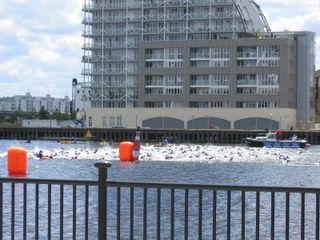
"And they'e off! Apart from the guy at the back, who appears to just be sitting there, Terry."
I found myself laughing – not hysterically, I found it genuinely funny. It only took ten seconds for an area of clear water to open up in front of me. I swam into it at a leisurely breaststroke - the underwater visions experienced when you’re looking forwards are less harrowing.
Fifty metres out from the start, I encountered a screamer. A man with very professional looking goggles was bobbing up and down and literally screaming. I stopped and asked him if he was all right. His response was as English as one could imagine. He stopped screaming instantly and quite clearly pronounced, “Oh yes, don’t worry, I’m just panicking. Carry on” before starting to scream again. I think one of the safety kayaks fished him out shortly after that.
Although the field was now comfortably 100 metres ahead, I wasn’t alone. A few stragglers were around me adopting various tactics. One guy was doing what looked like a very nice crawl, but I was catching him up with my very improvised breaststroke. Another chap was also doing the crawl, but it was like he had one massively overdeveloped hand – he would put his head down and hammer out a few strokes, only to stop, lift his head and realise he had veered violently off to the right. I expect that by the time he made it back to the transition (if he ever did) he had swum about three times as far as anyone else.
Two hundred metres in, I hit my first really low patch. My stroke was awkward, my back was already hurting, the cold water was giving me an ice-cream-headache and the halfway mark didn’t seem to be any closer than it had been five minutes before. I stopped again and bobbed around. A kayak pilot asked me if I needed help. I would have made a joke about psychiatry, but I was too busy trying not to say “Yes, get me out of here.” I started swimming again.
I’m not sure when it happened, but at some point in the next few strokes I realised I had found a good rhythm. Suddenly, I wasn’t in the least bit bothered by anything. I noticed without being happy or sad about it that I had passed the quarter distance point. I just kept breathing and swimming. Before I noticed anything else, I was asking the safety guard at the halfway mark if he knew the way to the ExCel centre. He had the decency to laugh.
The second half of the swim was much better. I started to reel in a couple of stragglers. I got so excited by the prospect of catching and overtaking someone that I risked a bit of crawl. That went well for about eight strokes until I hit a large rope in the water and stopped dead. There was a kayak paddling furiously towards me and the furious paddler was bellowing, “Get back in the course!” It would seem I’d suffered a similar directional hiccup to the guy with the big hand and swum at virtually ninety degrees to where I’d been aiming. I gave up chasing the people in front.
I hit another low about 300 metres from the end of the swim. I’d been able to see the bright blue pontoon quite clearly for ages, but it wasn’t getting any closer. The thought that I’d soon be able to quench the thirst that was building rapidly kept me going. I started to get excited about having a go on Tim’s bike. My concentration drifted off again and suddenly I was being ushered around a huge inflatable of a bottle of the sponsor’s product and pointed at the lifeguards waiting to fish me out at the finish.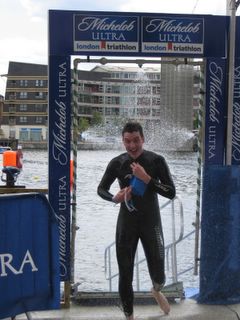
[Brian Blessed] "Gordon's alive!?" [/Brian Blessed].
As I climbed out and pulled my hat and goggles off, I wanted to scream with delight. I hadn’t drowned. I shakily climbed up the steps towards the transition. A small crowd gave me a big cheer. It was great. Everyone loves the struggling idiot at the back, and I’ll be honest, I quite enjoyed being that idiot. I stopped to wave at Tim and Caitlin. I spotted Craig Doyle doing an interview with Tim Don and bellowed at him “I thought you were doing the race! Where’s your wetsuit?” He had the good grace to laugh and bellow back “Focus!” while Tim Don just got grumpy about the fact that I’d interrupted their interview.
Tim Don, world number two, laughs at my efforts to get out of the wetsuit.
A very pretty lady started telling me to get my wetsuit off. I grinned at her and did as she told me to, all the time telling her “I didn’t die!” I think I was slightly delirious. I half- walked, half-trotted into the transition hall, found my bike, had a drink, got my gear on for the cycle and headed out. From the times I’ve looked at, an average transition from swim to cycle for an amateur duffer is around two minutes, tops. I took more than eight, but I couldn’t have cared less.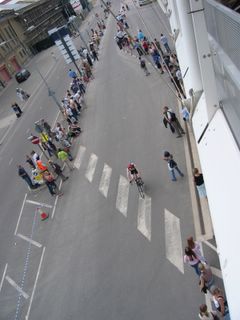
I was moving so fast, I started warping the zebra crossings.
The cycle itself was hard. It was a procession of bottoms whizzing past me at speeds I couldn’t comprehend while I wrestled with the gears on Tim’s bike that I hadn’t been sensible enough to work out how to use properly before the race. It was one long slog from beginning to end, only improved occasionally by being overtaken by a good-looking lady’s bottom or by passing a little pocket of enthusiastic spectators (everyone loves the stragglers).
Wet bottom + 96 minutes in the saddle = ouch
The most depressing bit was looking at the odometer and seeing I only had a kilometre left to go. This was depressing because when I looked up the road it was clear I had at least three more to do. Perhaps the course was longer in the slow lane. By the time I did wobble back into transition, I was glad to get off the bike. Despite the wonderful design of triathlon shorts, wet bums and bikes aren’t made for each other.
If my legs were slightly wobbly after the swim, they now felt roughly the consistency of Angel Delight as I trotted my bike back to its rack and rummaged around for my energy bar. I had run out of drink during the second lap of the cycle and was starting to feel a bit parched. I kept thinking about the advice to be found on the side of most fluid replacement sports drinks “By the time you feel thirsty, you’re already dehydrated!”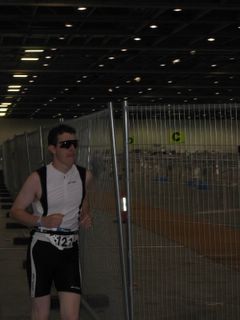
Sunglasses inside - one of my favourite looks.
I set off on the run at a blistering pace. At last I was doing some overtaking of my own. In the first hundred metres alone I overtook three officials sitting in chairs, and a table (although the last one might have been bolted to the floor to be fair). In truth, my running action was what Peter Kaye describes as “That running your dad does, where everything is moving around, but he could get there quicker by just walking.”
I got a cheer from my entourage (swollen by the arrival during the cycle of my housemate, Kate) as I exited the transition phase and hit the run course. The first kilometre was the worst. I did quite a lot of straight-off-the-bike-and-out-for-a-run training, so I had some idea of how my legs would feel, but they were worse than I’d hoped they would be. They ached from toe to (still damp) bum as I waddled past the cheering crowds. There’s nothing like looking pathetic to get you a (sometimes ironic) cheer from a bunch of complete strangers.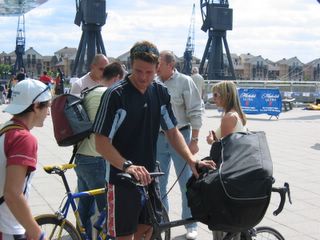
As I slogged around the cycle, James Cracknell was finished (he was 4th in our age group) and on his way home. Git.
I stopped for some water at a water stop (my first attempt at drinking while running having resulted in a mild choking fit) and probably drank too much at once. I burped my way through the next two kilometres around the dock before noticing a little speedboat with a camera team in it filming someone who was obviously coming up behind me. I had a look over my shoulder and saw… Craig bloody Doyle.
He threw a sweaty arm around my shoulder and dragged me along for a bit, chatting away. I hope he wasn’t wearing a microphone because I believe I may have sworn more than once when I finally managed to ask him how on earth he had caught me up. I knew I hadn’t been fast, but I was out of my wetsuit before he even put one on. He just laughed and told me I was doing really well and to keep going before powering off after the speedboat.
I discovered the next day that he was only doing the run stage of a BBC Celebrity team relay, but as he waved again passing me in the other direction I couldn’t have been more demoralised.
The run was physically the easiest bit to be honest, after the pain of the first kilometre wore off. The crowds and the prospect of actually making it to the end made the mental challenge easier too. That said, I was still dreading returning to the finish line to start my second lap. I had built that up in my mind as being the most likely moment for me to just give up – it seemed cruel and unusual to make us run right past the finish and do it all again.
In the end though, that moment was maybe my favourite of the whole race. I bobbled up the slope outside, feeling the hill bringing back the pain in my legs. I reached the top and turned into the building to be greeted by Timo and Sascha yelling at me like no man has ever been yelled at. I could feel a massive grin spread all over my face as I deviated off the racing line to congratulate Timo for finishing and wallow in the encouragement. It was three more kilometres before I remembered my legs hurt and by then, I was only two more from the end and starting to get demob happy.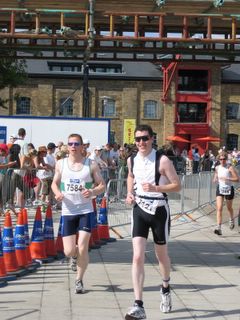
The muscle wastage over the course of the race was astounding - when I started, I looked like Arnie.
I finished in just over three and a half hours. Almost a week later, I’m still slightly choked when I really think about the fact that I finished it. To be honest, despite everything I’ve been telling you all for the last few months, I was almost convinced for most of my training that this one was going to go down as a valiant failure – just too hard for mortals with weaknesses.
I finished in a mere 16 hours, 40 minutes and 39 seconds.
The BBC’s coverage of the event will be shown on Grandstand tomorrow (Saturday) from about 2:45PM I think. I don’t know whether or not they’ll use the interview they did with us, but even if they don’t I’m looking forward to seeing the programme.
Huge thanks to all of you for your support (and money!), but special mentions for Tim, Caitlin, Kate, Timo, Sascha and Ritchie – without you lot, I’d have been fished out of the dock screaming most likely.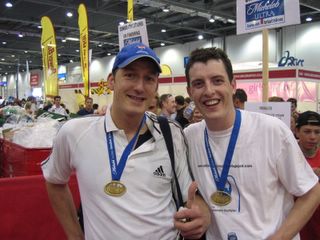
My first medal!
Posted by John McClure at 6:55 pm 9 comments
I didn't die!!!

But it was close run thing. My times we as follows:
Swim - 00:41:25
Bike - 01:36:39
Run - 01:01:37
Total - 03:30:24
Place - 666
I'll write more and put up the rest of the pictures when I get a chance. In the meantime, if I ever express any interest in doing another one, have me restrained.
Posted by John McClure at 10:27 am 14 comments
And then I go and spoil it all...
... by saying something stupid like, “Yeah, I’ll have another beer if there’s one going.”
I’ve always had a self-destructive streak, but being aware of it and preventing it from having an impact on my life are two very different things. Through the course of my triathlon training I’ve had good weeks and bad weeks. The good weeks have involved eating nourishing food, drinking only water or isotonic recovery drinks, sleeping for a full eight hours each night and (most importantly) six days of training and a day off. The bad weeks have involved the odd late night (occasionally fuelled by alcohol), the odd missed training session (or five), and even, more recently, the odd cigarette or cigar (see alcohol excuse above).
With one week to go until the event itself, last week constituted my last chance to do some hard training before beginning to ‘taper off’ my schedule. The problems started on Wednesday. The cricket match I was supposed to be playing in was rained off. I thought I’d stick my head round the door of the club on my way home anyway, just in case anyone had dropped in. Several jugs of Carlsberg and three cigarettes later, I staggered to the bus stop on the High Street with nothing more profound floating around my addled mind than “ooops!”
Somehow, I woke up on Thursday feeling physically fine (if somewhat guilt-ridden). I bounded through my working day without so much as a yawn, and when I got home, I jumped straight on my bike and headed for the pool. I got into the water intending to do 30 lengths, but when I reached that target in less than 15 minutes I figured I’d push on and do a full 1,500 metres (60 lengths). I finished in around half an hour, climbed out, towelled off a little and jumped straight on my bike again. Despite the beginnings of a slight weariness in my legs, I did the 4-kilometre cycle home (up a reasonably testing hill) about as well as I ever have.
I went to bed on Thursday night feeling like I’d cleared my conscience. I slept well. I woke up on Friday feeling like someone had driven a steamroller over my head. I was so tired I felt sick. Drinking hadn’t affected me much, but exercise had given me the mother of all hangovers.
Much discouraged (and utterly exhausted), I decided against a light run on Friday night, and instead went to the pub with Jamie and Gareth. I didn’t overdo it – just three pints of Guinness (and a cigar so small it barely warrants a mention) – and woke up on Saturday feeling much improved. So much improved in fact that I decided not to train.
On Saturday evening, I headed up to John’s to help him celebrate his birthday. I didn’t intend to drink, but had one beer just to be sociable. I very clearly told the Doctor not to let me have another. After the third one, I had to switch to rum to stop him giving me a hard time. The cigarettes John reluctantly gave me, I smoked purely to stop him feeling like some sort of social leper at his own birthday party.
Sunday was spent in bed, on the sofa and on the golf course. It ended very pleasantly with a couple of beers and a Dominoes pizza. Training would only have spoilt it.
I would feel guilty anyway, but due to the news of Tim’s forced withdrawal from the triathlon, I feel even worse. Despite (or possibly because of) the hours of training he has put in over the last few months, not to mention the money he has spent on gear, his neurologist has diagnosed his persistent tingly numbness as myelitis and forbidden him to race. He’s putting a brave face on it, but I can tell he’s gutted.
All round good egg (and masochist) that he is, Tim’s still going to come along this weekend and has even offered to let me use his bike. I’ll give it a road test on Friday night to see how I like it. I’ve grown emotionally attached to the Pale Rider over these last few months – she has done very well in training – but I will have very few qualms about dropping her for the new girl if it’s likely to save me even a few kilojoules of energy in getting around the 40km course on Sunday.
Despite my confessions of digressions, preparing for this event has become somewhat all-consuming. It is the default position of my mind at the moment to seize any idle moment and return to absently worrying about how it will all pan out. I find myself (sometimes at the oddest moments, but usually between beers) obsessing about what I’ll do if my goggles come off in the swim and I lose a contact lens, or how I’ll go about changing a bike tyre if I get a puncture. Even when I’m not training (so most of the time), I’m thinking about it.
As such, while it no doubt sent my mother up the wall, it was a welcome relief for me yesterday when I heard that my sister had gone into labour. Finally I had something else to worry and think about. Then she went and spoilt all that by giving birth to Emma at 11:51 last night. Mother and baby are both doing well, so I’m back to worrying about exploding inner tubes (mostly on bikes) and swallowing too much of the Thames.
Posted by John McClure at 3:48 pm 9 comments
I Love the Smell of Neoprene in the Morning...
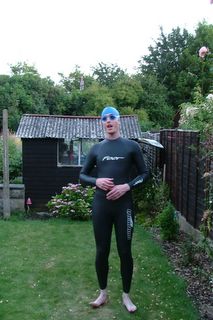
The veins in my hands bulge as my heart works overtime trying to get the blood around my body.
There's a bit of a standing joke in our office. Many of the people there are my friends as well as my colleagues, so occasionally, when we're out and we meet strangers, the dreaded question "How do you all know each other?" comes up. What follows is the briefest possible description of our work (anything more elaborate would render the listener unconscious within seconds), followed by the additional snippet that our company is split into sectors - Gareth works in sugar, Simon deals with starch, Rob's in charge of coffee and (here comes the funny bit) John's in rubber!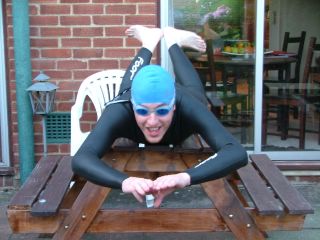
You can almost feel the extra buoyancy even without getting wet.
Well, tonight, for the first time, I finally was. I can't say I enjoyed it much, to be frank. At first I was convinced they'd sent me the wrong size, but later (long after I'd taken the suit off) I read the instructions for putting it on and discovered I might not have done it quite correctly. Even so, I'm fairly sure the rapid loss of blood flow to, well, everywhere will at best only be slightly reduced by putting the thing on as per the instructions.
Given my recent weight gain, I'm surprised the table didn't collapse.
If the photographs look like they were taken in a hurry, that's because they were - if we'd hung around any longer, I may have passed out. And I'm only slightly joking.
I apologise for the recent lack of entries. I have a post in mind about just how much time this training for the triathlon is taking up, but ironically, I haven't yet found the time to write it. Suffice it to say for now that I'm getting up in the morning, cycling to work, working all day, and then either cycling, running, swimming or doing a combination of all three in the evenings. By the time I'm done, sleeping is just about all I'm good for.
Speaking of which, it's way past my bedtime.
Posted by John McClure at 11:18 pm 18 comments
A Sunny Day at Lords
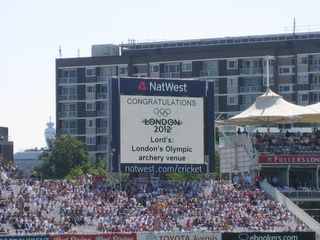
Last Sunday, I was lucky enough to go to Lords to watch a one-day international featuring England and Australia. The cricket wasn’t up to much to be honest, but Lords on a sunny day, packed to the rafters because the Australians are in town is a special place regardless of what actually happens in the game.
As the result drifted inexorably towards the Aussies, my attention wandered and I imagined how the place would look when it plays host to the Olympic archery events in 2012. I got a little shiver of excitement thinking about it.
The reality of what had happened in London the day after the Olympic announcement was never far away. When John and I got off the train in Paddington we asked a policeman for directions to Lords. He started to tell us which Tube we should get, but I interrupted him and told him that we wanted to walk. He gave us directions and we set off. I had an urge to rush back and tell him that we wanted to walk because it was a nice day and it wasn’t far, and not because we were scared to go on the Tube. As we walked to the ground past the high screens and floral tributes at Edgeware Road, I wondered if that was entirely true.
Once we’d picked up our tickets and made it to the ground, another reminder came in the form of a long queue as every bag was searched and every body patted down. By and large no one minded missing the opening few overs in the name of keeping safe, although one big-gobbed Cockney idiot felt the need to hassle the security staff about how long it was taking. That was irritating enough, but when his stage whisper could be heard throughout the minute’s silence that we all observed from outside the North Gate, I was surprised no one took a swing at him.
After the Olympic venue announcement I was very excited by it all. After Thursday’s bombings, that excitement disappeared in the face of such grim reality. But sitting there in the sunshine at Lords on Sunday imagining Olympic archers vying for medals in 2012 brought some of that excitement back again. I suppose in a way we owe it to those who died to carry on – to get excited by the trivialities of sport, to celebrate a society that allows us the freedom to pursue such trivialities, to take the Tube or a bus.
Just by Paddington station, there is a shop that I expect Lord Coe didn’t go out of his way to let the IOC visit when they came to London. I’m not quite sure it captures the ethos of the 2012 bid.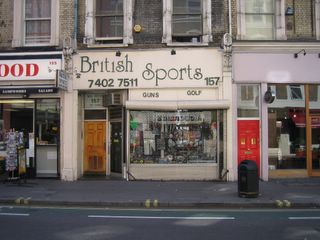
Posted by John McClure at 10:54 am 4 comments
Warning: Lycra!
Thanks to Adams and Sorrell, the Guardian's live sport coverage is back on the trail of trying to get me to change my name to Troy (see posts at 10:41 and 10:58).
In response to Tim's (frankly disturbing) pleas for photos of me in tight fitting sportswear, I give you the photos that no amount of airbrushing would have made acceptable to publish. Those of a nervous disposition should look away now.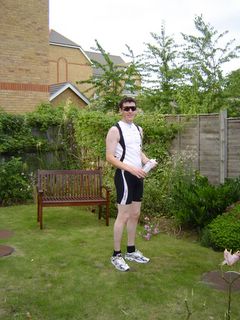
I think it's known in the trade as a farmer's tan.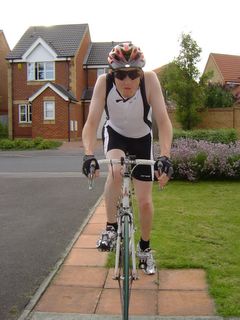
It may look like I'm pulling a funny face for the camera, but the truth is that those shorts are tighter than a photo finish.
Posted by John McClure at 11:11 am 3 comments
"Nice day... probably rain."
I was in London last Thursday to meet the guy from the publishing house who had expressed an interest in what I’m doing. Needless to say, other events that day took over somewhat from both the exciting news of London getting the 2012 games and of me meeting a publisher. Simon Barnes in the Times put it well:
“Sport requires a certain innocence. Without innocence, the glorious inconsequentialities of sport could not exist. We demand that people take part in sport as if it were a life-and-death matter, and yet all of us, participants and audience both, know that it is all most frightfully silly. It’s only that without the assumption of seriousness, it wouldn’t be any fun.”
And it’s hard to be serious about silly things when there are serious things going on all around you. Most Londoners set off to work euphoric on Thursday morning after the events in Singapore on Wednesday – in Britain, hope and joy are things that we tend to be reluctant to let ourselves indulge in, but Thursday morning felt good. The games are coming to London; it felt like the world had given us a vote of confidence. Not even the most miserable stereotype of a Briton would have dared suggest the extreme to which we could be whisked in less than 24 hours.
Statue John directed me to a blog he had read with a first-hand account of one of the bombs going off on a Tube train. Stuck in a carriage rapidly filling up with smoke the writer observes:
Once again, calm-down-guy managed to get everyone to do just that. Silence decended on the carriage apart from people choking and coughing, then someone near me quipped, “Well, at least we got the Olympics!”
There’s always one. And yet, at the same time, I understand that urge – the need to normalise it all with a joke – even if the joke betrays your most fervent wish to turn the clock back five minutes to when you were talking about sport and not staring your own death in the face.
I was going to blog about my whole day – about the meeting with Chrysalis; about waiting in the Hilton for the buses to start up again; about the woman sat near me telling her friend how she had hailed the number 30 bus but the driver hadn’t stopped because she had a pram; about finally getting back to Oxford and going for drinks with the Plants cricket team in the evening and seeing again that look of excitement and interest that certain types of people get when they hear about my challenge for the first time; about Stevo the Kiwi drinking enough lemon beer to suggest that he could try and do all the events from the winter Olympics so that between us we’d have the full set; about leaving my keys in the office and having to sleep in Neil’s living room – but in the end, it was hard to see that any of it mattered.
Simon Barnes finished his article, and I’ll finish this post, with something quite apposite:
”Sport is, above all, a celebration of being alive. Those people who willingly and frivolously turn it into a festival of being dead are bastards. Their eagerness to spoil the world’s innocent frivolities spells out the eternal truth about terrorism. It is this: terrorism is not about achieving things; terrorism is an end in itself.”
Posted by John McClure at 12:31 pm 0 comments
London get the 2012 Olympics

"I bet it didn't take you so long to open the envelope with the bribe in it, did it, Jacques?"
I didn’t think I was all that bothered – London and Paris (and it had looked likely to be one of those two for quite some time) are both pretty close by – either way, I’ll be attending the Olympic games in seven years.
Perhaps it was the brilliantly staged, tension-building show the IOC staged to announce the winner, although that’s unlikely, as I only got to a TV two minutes before the announcement, and even then, it was a TV in Dixons surrounded by other TV’s showing music videos.
Perhaps it was the accidental tension that arose when it seemed Jacques Rogge had forgotten how to open an envelope (did it ever take anyone so long? And why even bother? The vote was finalised an hour beforehand – he knew what was in the envelope already – why didn’t he just tell us?).
Perhaps it was the big sweaty man next to me in the shop who muttered “Get on with it!” just loud enough for everyone to hear – something in his urgent desire to know (one way or the other) spread throughout the thirty lunchtime shoppers who were by then staring at the screen.
Perhaps it was because I still remember the addled nonsense that was spouted by the drunken heckler at Stephen Martin’s presentation in February, and in a way I still hoped that London would get the games just to spite her.
Whatever the reason, as I stood there watching the head of the IOC fumble with the envelope, I found myself violently gnawing a fingernail and willing him to say the word “London”
And so he did. The little crowd in Dixons cheered, in that slightly self-conscious way that a ‘crowd’ of less than fifty people tends to, before breaking into a terribly English round of applause. I joined in, with both the cheer and the clapping. The news has cheered me up.
It’s easy to be cynical – about Live8, about the Olympic bid, about anything really – a well-timed cynical comment gets a laugh every time. But, for all their failings, these things have benefits, even if those benefits sometimes aren’t as identifiable or quantifiable as their costs. I’m going to set cynicism aside for a minute and say that I’m delighted London got the 2012 games.
Just as long as it doesn’t mean I have to listen to Heather Small singing that bloody song every five minutes for the next seven years.
Posted by John McClure at 1:07 pm 4 comments
Earworms
Earworms – not my latest injury, but the neat way to describe songs that get stuck in your head during the course of a day. On his blog, Swiss Toni hosts a guest spot every Friday in which he gets a loyal reader to submit their earworms from the week. Inspired by that, I thought I’d list my top five earworms-to-exercise-by. So, in no particular order:
All These Things That I’ve Done – The Killers
This sums up my whole challenge in a way, from its plaintive cries for someone to “help me out” to the spookily-apt-in-my-case line: “I want a meaning from the back of my broken hand” As I’m running along, I imagine a BBC montage of my exploits set to this song. Every time I hear it, that montage gets a bit more elaborate. At the moment, the long, thumping build-up where the singer chants, “I got soul, but I’m not a soldier” features me standing on a 10-metre diving board looking terrified. As it reaches a crescendo, I take off in slow motion and perform an intricate series of twists and turns on my way to a perfect, splash-free entry, drawing gasps from the crowd and a perfect score from the judges. Something tells me that if the montage ever happens it’s more likely to feature an agonising belly-flop set to the music from the Benny Hill Show.
Square One – Coldplay
I suppose the lyrics are quite apt in this song too (“you just want somebody listening to what you say”), but it’s the rhythm I like it for when I’m running. Every time it comes on the iPod I have the same thought: ‘I should seek out other songs with the same time signature to help me run’, but I never do. I had a similar song when I played golf (Moanin’ by Ray Charles) that always got me swinging at a good tempo if I could make it stick in my head, but that’s a hard thing to do. No matter how many times I listened to it on the way to the course, it was always easily dislodged, not least because it doesn’t have any lyrics. I’ve had more than one promising round ruined by a playing partner telling himself to “Wake up!” after a bad shot – you try getting rid of the Boo Radleys when you’re two under after five and trying to hold it together.
Meantime – The Futureheads
This is more a warning to anyone out there who jogs but has a weak heart – don’t ever run and listen to the Futureheads at the same time. Swiss Toni’s description of them as “A new wave barbershop quartet with thick Sunderland accents” doesn’t do justice to the Jam-inspired tempo at which their two-minute songs race to a finish. I found myself utterly out of breath for the first time in a long time last week and wondering why until I realised that while one Coldplay song will get me round a lap, or even a lap and a half of the park, the Futureheads had knocked out half their album by the time I’d made it round the first time, and I was foolishly trying to keep up with them.
Tame – The Pixies
As with the Futureheads, training to the Pixies is fraught with danger. Both bands will probably be useful for sprint training when the time comes, but I suspect that neither of them is doing my triathlon prospects much good. Nirvana were lauded for their ‘revolutionary’ song writing style involving the combination of slower, softer melodious interludes with frantic, neurotic and very, very loud spells of angst ridden guitar thrashing. But they never tried to claim they’d done anything new and freely admitted having copied the Pixies in this respect. So it is that a casual dog walker in the park may have been privy on occasion to the not entirely pretty sight of me suddenly bursting into a bit of a sprint for no apparent reason in the middle of a fairly gentle jog – little does he know that in my mind I’m being chased by an axe-wielding Frank Black who is screeching “Tame!”
Beautiful Day – U2
This song has it all – a good tempo, an uplifting melody, a chorus that makes you want to sing along (which I would advise against whilst running – for one thing, singing when you’ve got headphones on and can’t hear yourself is something to do in the privacy of your own home, but, more importantly, breathing is a key part of both endeavours and trying to do both at once is a bit like trying to talk on the phone while you’re playing the bassoon). Of course, when ITV used this song as their football show theme tune a few years ago, the sporting connection was sealed. On that note, another word of caution – listening to this song whilst running in the park can lead to you embarrassingly trying to join in with children’s football games as though they’re hearing the music too. They aren’t – and if their watching parents get even a little bit nervous about just how tight your Lycra running tights are, you could be looking at a seven stretch.
***
Inspired by the above tracks, triathlon training is still going well, even if I have been focusing rather too heavily on the running in recent weeks. I finally ordered my wetsuit and my triathlon outfit (very camp) yesterday. When said items arrive I will of course do my best to match Tim’s startling efforts to land a catalogue modelling deal before hopping on my bike and cycling to the swimming pool, or maybe even a swimming lake!
Posted by John McClure at 7:03 pm 2 comments
A Little Help From Henman
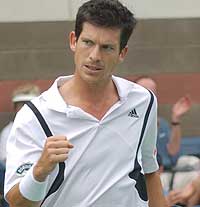
Tim Henman reacts to the news that the Guardian have posted a link to this website.
So Henman crashed out of Wimbledon in the first week, denying thousands of housewives all over Britain their chance to screech "Come on, Tim!" at the television for the rest of the tournament. Still, every cloud has a silver lining, and this cloud is no different.
While the housewives bite their fingernails and plead with the television, the Guardian website (Guardian Unlimited) does a sterling job of providing the office-bound masses with a means of following Wimbledon from the comfort of their desks. In the case of Tim’s calamitous loss last week, Sean Ingle was the game-by-game correspondent keeping the nation up to speed with proceedings at SW19.
The format is simple: Sean sits in his office watching the match on TV and posts updates to the website as events unfold. He also fields e-mails from those of us following his commentary, occasionally beefing up his analysis with the nonsense he receives.
I loaded up the page in good time on Thursday afternoon, only to find that at five past one Mr Ingle still hadn’t posted any preamble. I e-mailed him, and so it was that his second post read:
We’re off! Tursunov to serve. Meanwhile John McClure (who may or may not be related to the fictional Simpson’s character, Troy) is in fighting mood: "Hurry up, Ingle," he says. "Step away from the strawberries and get with it." Will do, John. Once they’ve finished warming up.
I’ve had the odd e-mailed comment posted on the Guardian’s over-by-over cricket coverage over the years, but as far as I can remember, this was my first appearance on the tennis coverage. I was quite chuffed. I e-mailed back and, a mere five posts later, I was in again.
First set: Tursunov* 2-3 Henman I'd be lying if I said this was scintillating feast of tennis - both men are making mistakes, and finding the net more times than Andrei Shevchenko. However Tursunov holds on, despite facing five breakpoints in his last two service games. Meanwhile John McClure (see earlier email) is back. "I'm no relation to the Simpson's star, but I have been offered money to name my first-born 'Troy'," he writes, sadly declining to mention just how much.
Of course, that required a response too, so I took a shameless punt to see if I could get Sean Ingle to tell the nation about the Ultimate Olympian. Sure enough, eight posts later (and I should warn those of you who find foul language offensive that Mr Ingle does nothing to sanitise Tiger Tim’s potty mouth in this one):
Second set: Henman leads Tursunov* 6-3, 1-3 "Come on!" cries Henman as he recovers from 40-15 down to have a breakpoint. The inevitable screams follow but it does little good as Tursunov wins the next two points. Henman fights back to earn another chance, but Tursunov produces an amazing drop volley to hold. The British No1's response? A loud "Fucccccccccccccccccck!" - but amazingly the umpire does nothing. Meanwhile John McClure is back. "I'm doing all 136 Olympic sports", he writes. "If your avid readers can contribute a grand to the charity I'm doing it for, I'll change my name and enter next year's London marathon as Troy McClure." Well, any takers?
Like I said, it was a shameless attempt at self-promotion, but it worked - the "136 Olympic sports" bit was posted as a link to this site. Still, no one was going to pledge any money for something quite so silly as me changing my name, right? Wrong. A mere three posts later:
Second set: henman leads Tursunov* 6-3, 2-5 Another Henman service game, another struggle. From 0-30 down he recovers to 40-30, only for the Russian to win the next three points. Oh dear oh dear oh dear. "Which charity is John McClure supporting?" asks Luke Williams. "If it's a good 'un, and if the offer is verifiable, I'll put up £50 notes." Top work, Luke. Anyone else?
Crikey. But still, a grand is a long way off fifty quid. I e-mailed again. Two posts later:
Third set: Henman* - Tursunov* 6-3, 2-6, 1-0 After watching his serve go into meltdown in the second set, Tiger Tim holds comfortably to 15. "The charity is the Sobell House Hospice," says John McClure. "They provide care for people with life-limiting illness and support for their families. It's a very worthy cause. And I'm off to the Deed Poll website."
And so I was. To my dismay, according to the website, it seemed perfectly legal and entirely inexpensive for me to change my name to ‘Troy’, even if only for the duration of a marathon. I got a slightly sick feeling in my stomach at that point.
I thought about how I’d react to hearing of some stranger doing something similar - the vehemence with which I’d call him an idiot - and I thought about that occasionally asked question on forms one has to fill out, ‘Have you ever been known by any other name?’
Thankfully, the tennis suddenly got exciting at that point and all talk of me changing my name subsided. The end of the match arrived and I had received no word from Sean Ingle that the thousand pound target had been reached. I logged off, slightly relieved.
A co-worker came over to my desk. “Getting a good bit of publicity there!” he enthused, presumably having spent the afternoon juggling work and tennis coverage himself. “You never know who might be reading!” he added. I agreed - you never do know. Even so, I was quite surprised to find an e-mail in my in-box the following morning with the subject ‘Book deal?’
It would seem that Ben Heywood from Chrysalis Books Group had also been keeping an eye on the tennis via the Guardian. He’d followed the link Sean Ingle had kindly provided to this site and made a few phone calls.
I’ll not go into too much detail yet, but suffice it to say for now that, by the end of Friday, Ben had not only sent my contact details to the editor of the relevant imprint at Chrysalis (Robson Books), but he had also (thanks largely to some apparent goading on the part of the rest of his office) agreed to be my partner for a synchronised diving event.
He was careful to stipulate that he’d commit to the 3m springboard, but only offer his services for the 10m platform provisional to his form in the former event. Oh, and that he would wear Speedos for no man.
I’ve since e-mailed the Southampton Diving Academy to see if they would be willing to help us out. Ben will no doubt be relieved to hear that they haven’t come back to me yet.
Needless to say, I’ll keep you posted as things progress.
[The full transcript of Sean Ingle’s commentary is here in case you missed it.]
***
In other news:
Triathlon training is going reasonably well, if not in terms of quantity, then certainly in terms of quality. This week, I have done something that I’ve never done in my life before - I’ve enjoyed running. Better still, on one run, I started off feeling dreadful and hating every step, but ran through that and was really enjoying myself by the time I got home again.
This afternoon I ran for 25 minutes (five laps of the park at the end of the road). That doesn’t sound like much I’m sure – probably about 6km - but when I think back to how I felt several weeks ago after a mere seven minutes (and one lap of the park), it feels like hefty progress.
Of course, to get to the running stage of the triathlon, I need to first not drown for a mile and then cycle a marathon. I’m off to bed shortly so I can get up for a swim before work tomorrow.
Posted by John McClure at 9:26 pm 3 comments